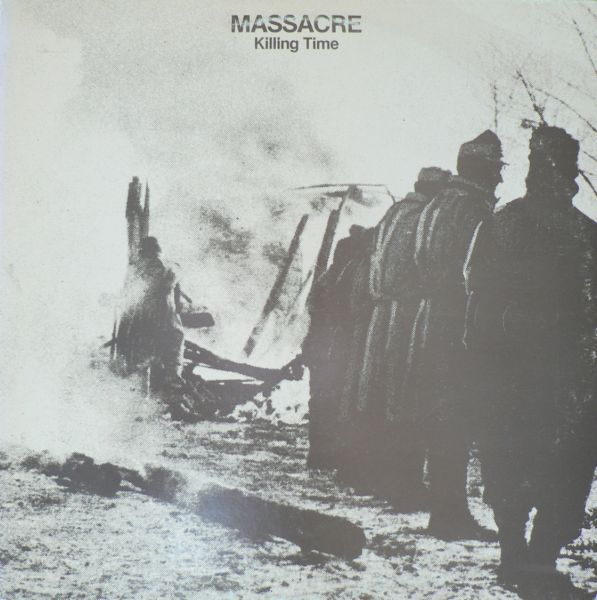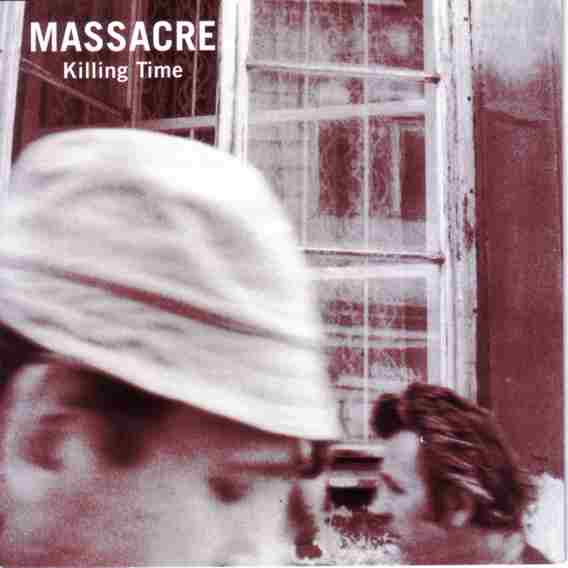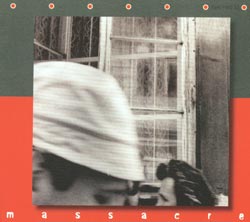MASSACRE






1/ You Said (Massacre) 1.46/1.47
2/ Legs (Massacre) 2.03/2.13
3/ Aging With Dignity (Massacre) 3.01/3.18
4/ Subway Hearts (Massacre) 2.45/2.59
5/ Killing Time (Massacre) 2.51/3.07
6/ Corridor/Lost Causes/ (Massacre) 8.33/9.15
Not the Person We Knew
7/ Know (Massacre) 2.16/2.16
8/ Bones (Massacre) 1.39/1.48
9/ Tourism (Massacre) 4.12/4.34
10/ Surfing (Massacre) 1.13/1.19
11/ As Is (Massacre) 8.05/8.49
12/ After (Massacre) 5.01/5.29
13/ Gate (Massacre) 2.38/2.52
14/ Coversations With White Arc (Frith,Laswell) 1.14/1.14
15/ Carrying (Massacre) 1.44/1.43
16/ Bait (Massacre) 2.00/1.59
17/ Third Street (Massacre) /4.21
18/ 3 o'clock, June 21st, Get Down (Massacre) 1.34/1.33
There and Do It
19/ F.B.I. (Welch,Marvin,Harris) /3.11
Tracks 1 and 16 recorded at at Inroads, New York
Tracks 2,3,5,8,10 and 13 recorded at OAO Studio, Brooklyn, New York
Tracks 4,6,7,9,11,12 and 15 recorded at Rue Dunois, Paris
Track 14 recorded live at CBGB, New York, April 1980
Track 17 recorded at Stone Club, San Francisco, California, June 1981
Additional work was done on the tapes at Sorceror Sound, New York
Engineer at Rue Dunois: Jean-Marc Foussat
Engineer at OAO: Martin Bisi
Engineer at Sorceror Sound: Greg Curry
Original LP and Live In Paris cuts remastered from the original 1/4"
analog mix reels in January/May 2005 by Myles Boisen at the Headless
Buddha Mastering Lab Oakland, California
All music composed or improvised by Massacre
Tape baking services by George Horn at Fantasy Records, Berkeley, CA
Fred Frith: Guitar, voice (using World War II pilot's throat machine), cassiotone; Bill Laswell: 4 and 6 string basses, pocket
trumpet; Fred Maher: drums, percussion.
1981 - Celluloid (France), CEL 6597 (Vinyl)
1982 - Recommended (Japan), 002 (Vinyl)
1983 - OAO/Celluloid (USA), CEL 5003 (Vinyl)
1983 - OAO/Celluloid (USA), CELD 5003 (CD)
1993 - RecRec Music (Switzerland), ReCDec 906 (CD)
2005 - Fred Records/ReR MegaCorp (UK), ReR/FR010 (CD)
Note: Tracks 1,7,14,15,16 & 18 (as track 17) only appear on the RecRec Music version.
Massacre was never simply 'Fred Frith plus rhythm section' but a genuine meeting of equals. Laswell and Maher had been around the new wave/no wave scene and were as influenced by funk and dub reggae as they were by rock music, and they had also both played with Daevid Allen in New York Gong. The collision of these styles with Frith's RIO approach yielded musical results that sound as fresh today as they did over 25 years ago. The power trio line up, stripped down sound and stop-start arrangements are all deployed to great effect, with the three musicians evenly balanced in the mix. The playing is incredibly tight throughout, with some of the pieces sounding carefully composed and others sounding more improvised. Fred Frith uses a world war 2 fighter pilot's throat mike to add some bizarre and slighlty disturbing vocal sounds here and there, and there are a couple of sound collages punctuating the album, but for the most part there is little studio trickery in evidence. Highlights include the RIO/funk/punk masterpiece Legs and the lengthy Corridor/Lost Causes/Not The Person We Knew, where each section features one of the three musicians taking the lead. The CD reissue contains the entire vinyl release plus numerous live recordings which almost double the original playing time, but the sound quality is excellent throughout and the extra tracks add to the power of the original.
This was a hugely influential album, and echoes of it can be heard today in bands like Ruins, Korekyojin and Forever Einstein. It's also an album to treasure for Fred Frith's brilliant guitar work, which is not always this prominently featured. It's an essential document of RIO colliding with post punk noise, with extremely enjoyable results - as it says on the label: PLAY IT LOUD! Highly recommended.
4.5/5
Syzygy (courtesy of the Prog Archives website)
At the very end of Aksak Maboul, Fred Frith (and his Henry Cow cohort Chris Cutler) will retain their Belgian connections and start the Honeymoon Killers, but in the meantime, the guitarist will start Massacre with the then-new bass wizard Bill Laswell and rather unknown drummer Maher for a one shot album recorded after on their short tour supporting their mentor. This Massacre project was a bit the result of a demand of Blegvad for a support group. Whether this was effectively a one-shot from the start or it turned out to be so for almost two decades remains a mystery to this writer, but the fact is that Massacre's only album, Killing Time was alone in the store's stocks for quite a while.
Ultra technical is the first word that comes to mind when listening to Massacre, along with dissonant, un-melodic, overly complex, self-centered and many more. Indeed these words do not sound that positive, but they must be also accompanied with a bunch of others such as stunning, groundbreaking, virtuoso, adventurous, bold etc.. Of course, Killing Time is not for beginners or even novices, but rather for confirmed progheads that know they will be able to digest more or less quickly. This almost completely instrumental (just a few vocalizing) guitar trio's album is full of fairly short tracks (except for As Is) outlining their tightness as a group, which may appear a little strange at first, but very few moments are improvised, the vast majority being written. Contrarily to what could be expected from an instrumental trio, there are no one-man solos and very few accompanied solos and when there are, they generally come from Cutler and remain short and avoid any kind of indulgence or complacency. Even at their most accessible (the title track for example), Massacre remains quite difficult for those not used to dissonance and constantly changing rhythms.
Although largely forgotten nowadays, Massacre's first album's historical importance might still not be that obvious, but can we imagine all these Us techno-prog projects with Bozzio , Levin, Sheridan and whoever else indulged, without Killing Time's existence. I dare think not. Not that I would call this album all that essential, but quite worthy still.
3.5/5
Sean Trane (courtesy of the Prog Archives website)